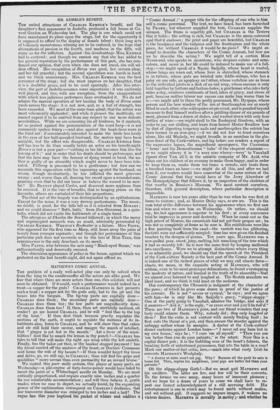MR. KEMBLEIS BENEFIT.
THE united attractions of CHARLES ICEssistE's benefit, and his daughter's first appearance in Isabella, produced a full house at Co- vent Garden on Wednesday last. The play is one which could mit have maintained its place upon the stage, but for the opportunity it is supposed to afford to the display of female talent : three long acts of tediously monotonous whining are to be endured, in the hope that alternations of passion in the fourth, and madness in the fifth, will repay us for the infliction. Against this disadvantage Miss KEMBLE had to contend ; and though we cannot say that she has added to her general reputation by the performance of this part, she has con- firmed our opinion, that even when she does not excel, she will sel- dom offend. Her recognition of Biron was good, her scream clear, and her fall graceful ; but the second ejaculation was harsh in itself, and we think unnecessary. Mrs. CHARLES KEMBLE was the best screamer of the stage ; but she must impress on her daughter, that it is a doubtful grace, and to be used sparingly. After this inter- view, the part of Isabella assumes some importance : it was uniformly well played, and free, with one exception, from the exaggerations with which less judicious performers have overloaded it. We do not admire the manual operation of her hauling the body of Biron some yards across the stage: it is not new, and, as a feat of strength, has been exceeded. We must at the same time admit, that the action was most vehemently applauded ; and while it pleases the multitude, we cannot expect it to be omitted from any respect to our more delicate sensibilities. While we are censuring (in all kindness, be it marked), let us protest against the pronunciation of the word bury--it is not commonly spoken bewry ;—and also against the head-dress worn in the third act : if considerately intended to make the bride less lovely in the eyes of her half-accepted husband, the motive may have been amiable, but the effect was disagreeable. CHARLES KEMBLE him- self has less to do than usually befals an actor on his benefit-night. Biron's is but a poor part—" nothing in his life becomes him like the leaving of it ;" and in order that his death should be picturesque, and that the hero may have the honour of dying sword in hand, the au- thor is guilty of an absurdity which ought never to have been tole- rated. Filleroy is presumed to be a gentleman ; but how can we reconcile this supposition with his vapouring against the husband, on whom, though involuntarily, he has inflicted the most grievous wrong ; and, worse than all, drawing his sword upon a wounded man, granting even that he did not know or believe the wound to be mor- tal? Mr. BENNET played Carlos, and deserved more applause than he received. It is the vice of benefits, that in heaping praise on the favourite, others are curtailed of their fair proportions.
The third act of the tragedy was distinguished by an epithalamium. Except for the noise, it was a very drowsy performance. The music, no doubt, is good, for the bills tell us it is selected from MOZART; and we could discover" Batti, batti," from Don Giovanni, in a quin- tett°, which did not excite the battimento of a single hand.
The afterpiece of Charles the Second followed ; in which the merry and unprincipled monarch was, as usual, admirably personated by CHARLES KEMBLE. WRENCH'S Rochester is a failure. Miss FOOTE, who appeared for the first time as Mary, still bears away the palm of beauty from younger aspirants ; and though her performance of this particular part does not reconcile us to the loss of Miss TREE, this reminiscence is the only drawback on its merit. Miss PATON, who between the acts sang " Black-eyed Susan," was enthusiastically and deservedly encored. The obnoxious appearance of police in the house, against 'which we protested on the last benefit-night, did not again offend us.


















 Previous page
Previous page